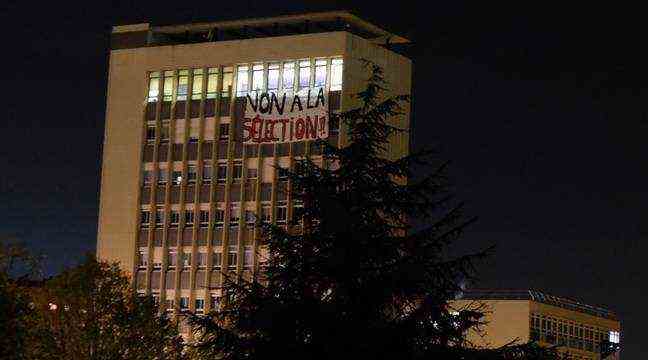Thirteen days of voluntary confinement for students without college at Paris Nanterre University. They occupy the presidential quarters to claim their right to study. “Studying is a right not a privilege”, affirms Barthélemy, activist of the UNEF, referring to the right to the continuation of studies in master, adopted by a decree last May. The president of the university, Philippe Gervais-Lambony, has already enrolled nearly 300 students and said he did not want to go any further.
Cloistered inside the Grappin building, that of the presidency, around thirty students took control of the first and eighth floors. There is no longer any question for the students to leave the building on pain of being prevented from going back up by the security guards who have been particularly controlling the entrance in recent days. So, to eat, get medicine or comfort items, the students hang up a bag, which their supports come to fill, from the first floor.
“The Covid has well arranged the Ministry of Higher Education because we have not seen the problems related to the reform of the bac, which sends more students to college when there are no more of places created. But there, the situation is catastrophic “, alarms Nathalie, member of the FSU 92 teaching union. ‘had no college spots this year. After the dropouts, reorientations and places found, there are only 61 students remaining who apply to be enrolled at the University of Paris Nanterre.
The presidency comes out of silence
The thirty students who occupy its premises denounce a lack of openness to dialogue by representatives of the university. “The presidency canceled, Sunday evening at 11 pm, the meeting which was to take place Monday”, arguing that there would be no exchange until the occupation would not end, explains Barthélémy.
This Monday, at midday, the presidency finally came out of its silence and issued a statement, defending itself having already resolved nearly 300 situations of unassigned students. “The University of Nanterre has become a target, deemed responsible for this situation,” she says. […] Seen more closely, things are more complex. “
With the return to campus on Monday of the students who had been on vacation until then, “we can see that our demands are widely shared,” explains Barthélemy. “On our side, we do not change anything, he promises. Last night [lundi], at 7 p.m., we organized a rally, this evening we have a general assembly. And we maintain the occupation. “
A lack of funds at the university
For its part, the presidency explains the situation by a lack of resources. “This university [est] one of the most under-supervised at the national level, with a ratio of 2.7 tenured teachers per 100 students and even stronger sub-supervision in terms of administrative staff ”, defend the university representatives in the press release.
They denounce the stakes “for the public service of higher education [qui] are national ”and are due to a lack of resources. “On the staff side too, we are starting to crack,” says Nathalie. “It’s a real problem, there is a lack of 35,000 places in France, the equivalent of a big university like that of Nanterre,” she adds. “We want to hear about the lack of resources or space, but the solution is not to violate the rights of students and to refuse enrollments en masse, indignant Barthélemy. The solution is to manage to find the means ”.
The diehards who refuse to leave Nanterre
The representatives of the university deplore that “solutions found and proposed are refused on the sole principle that they are not in Nanterre”. Faced with this problem, the UNEF and the students without university offer a compromise: of the 61 students who do not have places at the university, 20 agree to be educated elsewhere.
Alexandra Combemorel is one of the students without university who absolutely want to continue their education in Paris-Nanterre. After having validated her license 3 in psychology with the honorable average of 14, she does not understand why her university rejects her. “I really felt at home there and it hurts all the more. “Rejected from Paris-Nanterre as from each of the 20 other universities to which she applied, she feels a great injustice. “If the rectorate sends me to another university, it means that the Nanterre university is clearing its responsibilities,” she justifies. […] I prefer to fight and assert my rights, so that all those without university in France can say to themselves that it is possible for them too. “

